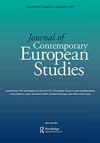Sticking to the core or going beyond? The Austrian freedom party’s educational approach in a longitudinal perspective
IF 1.8
3区 社会学
Q1 AREA STUDIES
引用次数: 1
Abstract
Although populist radical right parties (PRRPs) are actively studied in recent years, few research has addressed their approach to education policy. Previously not considered one of their signature issues, this paper argues that education has become important for PRRPs too. In a case study of the Austrian Freedom Party (FPÖ), one of the most longstanding and successful PRRPs in Western Europe, we explore key pillars of the FPÖ's educational positions and their development over time. Drawing on qualitative content analysis of party programs, election manifestos and plenary debates from 1990 to 2020, our analysis shows that the policy area of education has indeed become an ideological battleground for the FPÖ. Its educational positions are largely grounded in the ideological core of PRRPs and comprise a fundamental critique of mainstream parties’ dominance in educational institutions (anti-mainstream); a nativist division on all levels of education (nativism); the advocacy of merit-based educational institutions coupled with authoritarian instruments of schooling (merit); and a plea for more liberalisation and competition in schools (liberalisation). Over time, positions become more nuanced, albeit only within the already established traits. These findings corroborate theoretical arguments for the influence of growing party age and government experience on PRRPs’ positions.坚持核心还是超越核心?纵向视角下奥地利自由党的教育方法
尽管近年来对民粹主义极右翼政党(prrp)进行了积极的研究,但很少有研究涉及其教育政策的方法。这篇论文认为,教育对prrp来说也变得很重要,而这在以前并没有被认为是他们的标志性问题之一。在奥地利自由党(FPÖ)的案例研究中,我们探讨了FPÖ教育立场的关键支柱及其随着时间的发展。奥地利自由党是西欧历史最悠久、最成功的prrp之一。通过对1990年至2020年的政党纲领、选举宣言和全体会议辩论的定性内容分析,我们的分析表明,教育政策领域确实已成为FPÖ的意识形态战场。其教育立场在很大程度上基于prrp的意识形态核心,并包括对主流政党在教育机构中的主导地位(反主流)的基本批评;在各级教育中实行本土主义的划分(本土主义);提倡以成绩为基础的教育机构,加上专制的学校教育工具(成绩);并呼吁在学校实行更多的自由化和竞争(自由化)。随着时间的推移,立场变得更加微妙,尽管只是在已经建立的特征范围内。这些发现证实了理论论点,即政党年龄的增长和政府经验对prrp立场的影响。
本文章由计算机程序翻译,如有差异,请以英文原文为准。
求助全文
约1分钟内获得全文
求助全文
来源期刊

Journal of Contemporary European Studies
Multiple-
CiteScore
2.70
自引率
7.70%
发文量
84
期刊介绍:
The Journal of Contemporary European Studies (previously Journal of European Area Studies) seeks to provide a forum for interdisciplinary debate about the theory and practice of area studies as well as for empirical studies of European societies, politics and cultures. The central area focus of the journal is European in its broadest geographical definition. However, the examination of European "areas" and themes are enhanced as a matter of editorial policy by non-European perspectives. The Journal intends to attract the interest of both cross-national and single-country specialists in European studies and to counteract the worst features of Eurocentrism with coverage of non-European views on European themes.
 求助内容:
求助内容: 应助结果提醒方式:
应助结果提醒方式:


